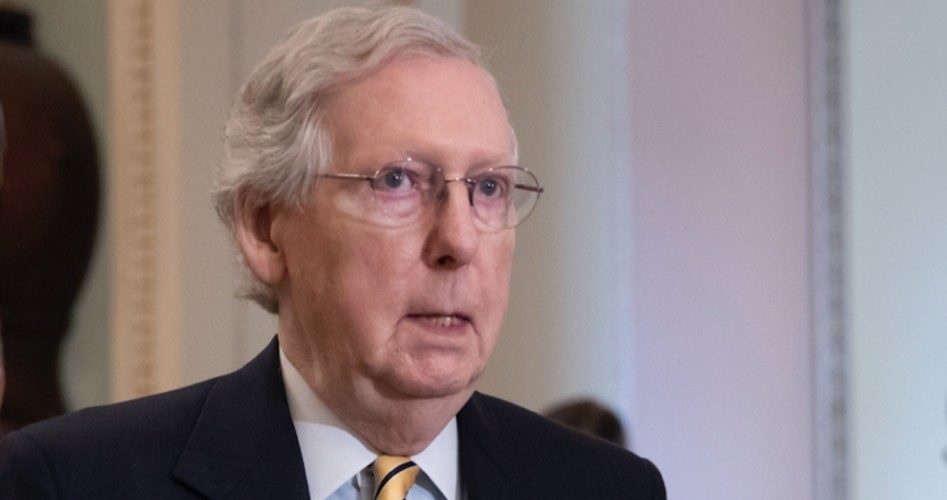
Senate Majority Leader Mitch McConnell has a message for the Democrats: You had better get on with confirming Brett Kavanaugh to the U.S. Supreme Court, or we’ll let this drag through the Fall and make it a campaign issue back home.
Kavanaugh is President Trump’s nominee to replace Associate Justice Anthony Kennedy, a reliable for the Left on social issues such as abortion and homosexual rights. Though Kavanaugh is by no means a certain reliable vote for constitutional restraint, or, for instance, in overturning the Roe v. Wade abortion decision, Democratic chieftain Chuck Schumer (D-N.Y.) has promised to scrutinize every document Kavanaugh ever produced.
But whether McConnell follows through on the threat remains to be seen. He helped stop Trump nominee Ryan Bounds’s quest to become a judge on the Ninth Circuit of Appeals because of Bounds’s alleged “racially-charged writings” in college, even though the writings were known long before McConnell pulled the plug.
Republican turncoats persuaded the White House and McConnell to deep-six the Bounds nomination.
Election Problem
The warning from McConnell on Kavanaugh — to delay the confirmation vote until it’s campaign time — “would serve a dual purpose for McConnell,” Politico reported.
First it would keep “vulnerable red-state Democrats off the campaign trail while potentially forcing anti-Kavanaugh liberals to swallow a demoralizing defeat just ahead of the midterms.”
Second, “McConnell believes the Democratic base will be ‘deflated’ if [Democratic senators] raise hopes of defeating Kavanaugh only to lose just days before the election.”
As South Dakota’s John Thune told Politico, the Democrats should fear a delay: “One is, you’re stuck here, you can’t get home. And two, the vote is going to be of significant consequence in a lot of those races. I don’t know how it’s to their benefit to drag it out.”
The court’s next session begins October 1, which is why McConnell wants to confirm Kavanaugh as soon as possible, and the Senate leaves town to campaign during election years, the website observed.
Senator David Perdue (R-Ga.) called Schumer’s tactic “historic obstructionism,” which isn’t quite right. Perhaps he doesn’t remember the mauling of President Reagan’s nominee, Robert Bork, in 1987. Back then, combing through documents meant trying to get the man’s video rental records.
For their part, Politico reported, Democrats “insist they’re holding Kavanaugh to the same standard that governed the release of an estimated 170,000 documents on Justice Elena Kagan’s record before her Supreme Court confirmation. But Republicans protest that Schumer is slowing down Kavanaugh to an extent that they never imposed on Kagan, with the New York Democrat refusing to even meet with Trump’s pick before a document deal is reached.”
The Bounds Nomination is Pulled
The question is whether McConnell will do what he says, given what happened to Ryan Bounds, who had received a qualified rating from the leftist American Bar Association.
“Fearing imminent defeat,” as Roll Call termed it, McConnell and the White House pulled Bounds’s nomination just one day before the confirmation vote.
But Trump and McConnell acted at the behest of two renegade “conservatives”: One was Senator Marco Rubio of Florida, one of the 16 victims of the Trump juggernaut during the GOP primaries in 2016. The other was Senator Tim Scott of South Carolina, who is black.
It appeared as if Bounds, a federal prosecutor in Oregon who graduated from Yale Law School, would be confirmed until Scott claimed to have suddenly discovered the “racially-charged” material from his college days at Stanford a quarter-century ago.
According to the hard-left Alliance for Justice, Bounds’ conservative views are, well, out of bounds for a judge.
Among other things, Bounds wrote critically of the race hustlers who dominate the American campus, complaining about those who “divide up by race for their feel-good ethnic hoedowns.”
He wrote that “race-focused groups” should not continue on campus, claiming that the “existence of ethnic organizations is no inevitable prerequisite to maintaining a diverse community — white students, after all, seem to be doing all right without an Aryan Student Union.”
Using racist and offensive language, Bounds claimed that there were communities on campus who believed that the “opponent is the white male and his coterie of meanspirited lackeys: ‘oreos,’ ‘twinkies,’ ‘coconuts,’ and the like.”
Similarly, Bounds accused campus “race-thinkers” of denigrating African-Americans as “oreos,” “Uncle Toms” or “sell-outs” if they rejected “victimhood status.”
This was beyond the pale.
According to Roll Call, Scott told Rubio he would vote against Bounds. “Sen. Scott needed more time to talk to people who knew him and that’s not available. Sen. Scott said he couldn’t vote for him today if the vote was now. I support him in that decision,” Rubio said.
Politico reported that Scott spoke to Bounds by telephone, and “after talking with Rubio … the two senators met with Bounds in person. But neither conversation persuaded them.
But Bounds couldn’t “alleviate Scott’s concerns” and show “how he had grown” in the last 25 years, a source told Politico.
Wrote David Lat at Above The Law, “This was rather late of Senator Scott to be raising these issues. They’ve been known about for months; Bounds’s confirmation hearing took place on May 9, and he was voted out of committee on June 7.”
The liberal judicial advocacy group Alliance fo Justice sent its letter, calling Bounds “intolerant” and “outrageous,” to senators on June 6.
Wrote Lat, “And here’s the most perverse aspect of the situation: Senator Scott voted in favor of cloture on the Bounds nomination — which, as noted, is generally a prelude to a successful confirmation vote.”
Lat believes the college writings of judicial nominees should not be considered.
The Bounds affair is instructive as to whether McConnell’s threats will work. After all, who knows what someone might dig up about Kavanaugh?
Photo of Senator Mitch McConnell: AP Images



